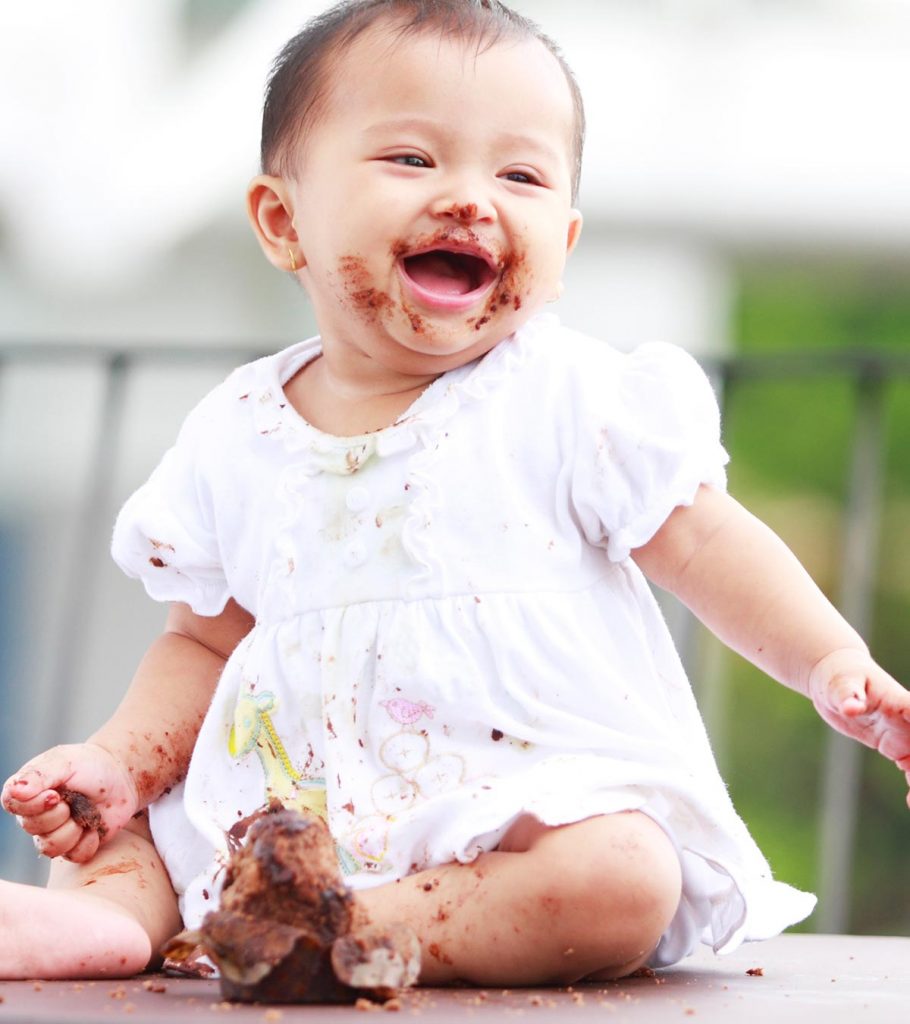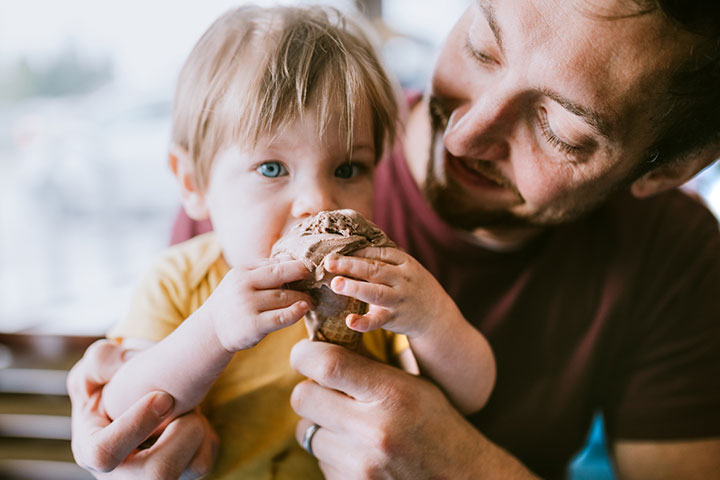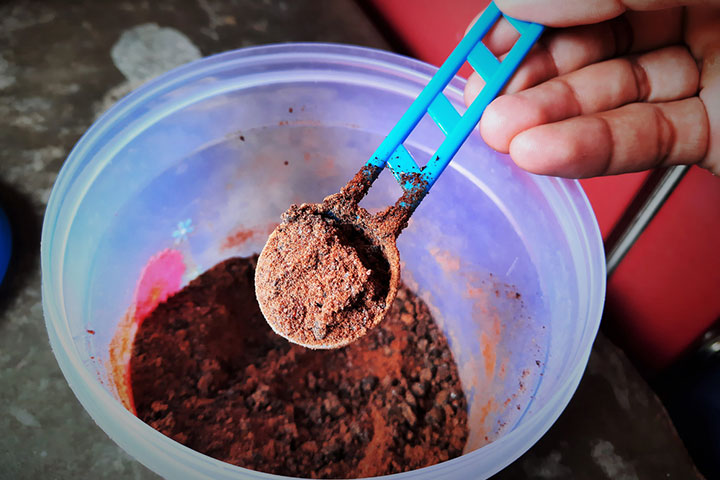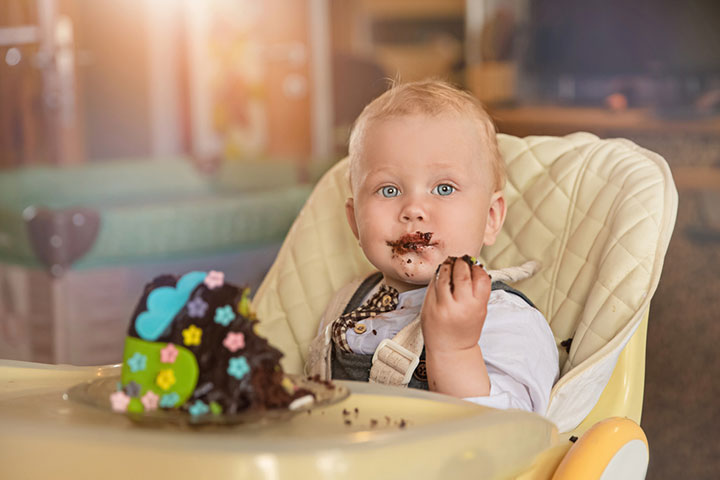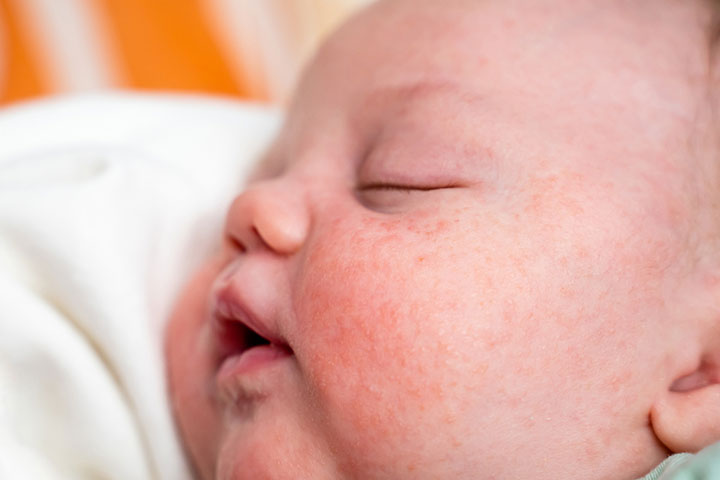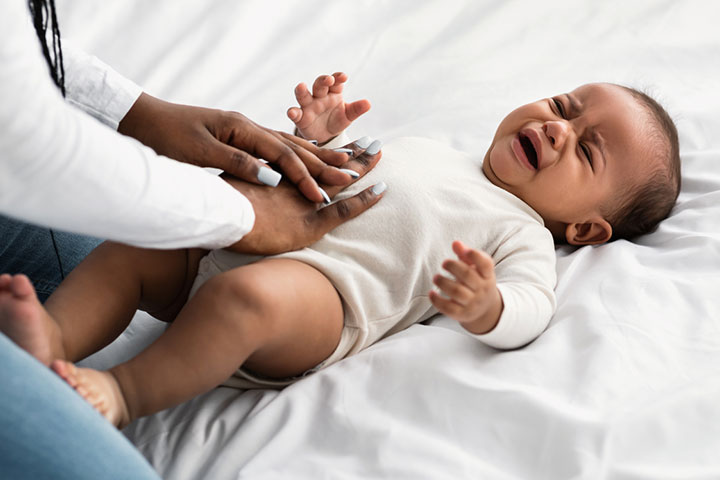Many mothers wonder when they can introduce chocolate to babies. Chocolate is a favorite food for many, but children cannot have enough of it. So they get attracted to chocolate bars. However, It is better to avoid giving chocolate to babies because their digestive system may not be mature enough to process caffeine and sugar in the chocolate bars. Instead, it is recommended to feed healthy foods such as vegetables and fruits. If you want some details on chocolate for babies, its safety, benefits, and side effects, keep reading our post.
When Can Babies Eat Chocolate?
The recommendations are to wait until your baby is 24 months old as chocolate contains caffeine and sugar which are not suitable for babies under this age. Also, the baby’s digestive system may not be developed enough to process it without an adverse reaction (1).
Chocolate also contains theobromine, which has only one-tenth the effect of caffeine and is a weak stimulant. But it is the caffeine content in chocolate that is often a concern, even for infants who are older than six months and are capable of eating other solid foods (2).
However, this should not stop you from giving chocolate to your baby after 24 months, as it has some health benefits.
Is Chocolate Good For Your Baby?
Yes. Chocolate is a comfort food that can benefit your baby in more than one way. Here are a few:
- Supports brain functions: Compounds called flavanols, naturally found in chocolate, can help boost memory function while also improving general cognitive capabilities (3).
- Helpful to the circulatory system: Regular consumption of chocolate has shown to improve the performance of the heart and blood vessels. The flavanols found in chocolate also prevent blood clots and improve blood circulation (4).
- Helps reduce cell damage: Chocolate is rich in antioxidants, which are also found in several fruits and vegetables. These antioxidants minimize natural cell damage and improve the efficiency of various cell functions (5).
- Can uplift mood: Chocolate stimulates the production of the neurotransmitters called endorphins, which are known to create a feeling of happiness in a person. Another compound called serotonin, known to contribute feelings of well-being and happiness, is also naturally found in chocolate (6).
- Reduces bad cholesterol levels: You may not worry about cholesterol in babies! But it is still good to know that consumption of chocolate can support the reduction of LDL cholesterol level (the “bad” cholesterol) and increase HDL cholesterol (the “good” cholesterol). However this evidence is found with dark chocolate.
Edible chocolate is available in many forms. So, which one to give your baby?
What Is The Best Way To Introduce Chocolate To Babies?
Chocolate milk is believed to be the safest form of chocolate for babies, over the other forms. The reason is that on average, a pre-made, packaged chocolate milk contains only 5mg of caffeine per 8oz (226g) compared to 160mg found in dark chocolate of the same weight (7). Even milk chocolate contains about 48mg of caffeine in 8oz. Therefore, a baby will have a lesser intake of caffeine when consuming chocolate milk than a chocolate bar.
If choosing readymade chocolate milk for the baby, select one with low sugar, no preservatives, and fortified with nutrients for nourishment.
Can You Use Chocolate Powder To Make Chocolate Milk At Home?
Yes, you can prepare chocolate milk at home by selecting a chocolate-flavored, malt-based drink or by using plain cocoa powder. Plain cocoa mix/ powder beverage contains about 5mg of caffeine in 6oz (206g) while a chocolate malt-based drink contains 6mg of caffeine in 8oz (265g).
Cocoa powder is usually available as an unsweetened plain chocolate powder. It means you can regulate the amount of the sugar added to the milk. However, it does not have any added micronutrients. Choose baby formula and malt-based drinks with less sugar and no added preservatives, as these contain essential micronutrients.
Can A Baby Have Chocolate Desserts?
Experts state that it is okay for a baby to have an occasional bite of sweet, treat, dessert, or confectionery that contains chocolate, such as chocolate candy, a dark chocolate bar, chocolate cake, and chocolate pudding. A few bites do not contain enough caffeine to harm the infant. Remember that small chunks of chocolate can be a choking hazard so if giving them to your baby monitor them and always be present to reduce this risk.
Can Chocolate Be Bad For Your Baby?
There is no scientific evidence to show the negative effects of consuming chocolate. Perhaps the only risks of consuming chocolate are linked to added sugar and caffeine. It’s important for parents to be mindful of their baby’s chocolate intake as overindulgence can potentially hinder their growth and development. Drinking excess sugar-laden chocolate milk may increase the risk of your baby being overweight or obese. a baby overweight or obese. You can avoid that by choosing low-sugar or zero-sugar chocolate beverages.
While the caffeine content in chocolate remains a concern, giving it in moderation will ensure that your baby enjoys chocolate without any risks. There is no standard limit on the amount of chocolate a baby can have in a day, but experts recommend no more than 45mg of caffeine a day for a preschooler. So it is probably less for toddlers at home.
Can A Baby Be Allergic To Chocolate?
Yes, a baby can be allergic to chocolate. Chocolate is made from the seed of the Cacao plant, which has the potential to cause an allergic reaction. The indicators of chocolate allergy are similar to other food allergies. Look out for symptoms such as skin hives (rashes), stomach cramps, vomiting, nausea, swelling of the face, and lethargy.
When To Avoid Chocolate For Babies?
There are seldom any adverse effects of moderate chocolate consumption among babies. However, it is best to avoid chocolate in some situations:
- Before bedtime: Even a small amount of caffeine before bedtime can make it harder for a baby to fall asleep. So, avoid giving chocolate milk or any other chocolate product or snacks to the baby a few hours before sleep (8).
- Irritable bowel syndrome: Irritable bowel syndrome (IBS) is an acute condition characterized by chronic abdominal bloating, stomach cramps and sudden changes in bowel habits. Chocolate is one of the leading foods that can trigger symptoms of IBS (9) and should not be given to babies diagnosed with this problem.
- Gastroesophageal reflux (GERD): Chocolate can be acidic in nature, and may trigger acid reflux in infants with GERD..
If your baby has a clinically-proven food allergy, then you must be extra careful about giving chocolate to the baby. You can consult a pediatrician before introducing chocolates in such cases.
Can Chocolate Cause Tooth And Gum Decay Among Babies?
Too much indulgence in sugar-laden chocolate products can cause tooth decay and gum problems in babies. However, it is to be noted that the added sugar in chocolate beverages is the real culprit and not the chocolate/cocoa itself (10). So, selecting chocolate beverages with low sugar allows your baby to enjoy the taste of chocolate without being exposed to the harmful effects of excess sugar.
Can A Baby Eat Cacao Fruit Pulp?
Babies should not be given cacao fruit pulp because the pulp contains some amount of caffeine and other stimulants such as theobromine (11) (12), which can impact a child’s development. The American Academy of Pediatrics suggests introducing chocolate to babies after two years of age. This is because caffeine intake in babies may cause several side effects, such as dehydration, anxiety, and restlessness (13).
What Are The Origins Of Cacao And Chocolate?
Chocolate comes from cacao, a tropical tree mainly found in the rainforests of Central America. The tree bears fruit between 18 and 30 months after planting. Once the fruit ripens, these pods are plucked to harvest cocoa beans or seeds. The seeds are then fermented, dried, processed, and grounded to separate cocoa butter from cocoa solids (14) (15).
Chocolate has benefits such as uplifting the mood, promoting cardiovascular health, and improving brain functions. You may give chocolate milk, especially the one made using chocolate powders or pediatric formulas with chocolate for babies after two years of age. However, it is advised to avoid chocolate milk with excess sugar as it can cause obesity. It is better to introduce chocolate to babies after 24 months since their digestive system cannot process caffeine and sugar in chocolate bars. It is also essential to ensure that your baby is not allergic to chocolates.
Key Pointers
- Chocolate consumption in babies younger than two years is not recommended due to its caffeine content.
- Chocolates may offer some health benefits to children older than two, such as reduction of bad cholesterol, upliftment of mood, and enhanced brain and heart health.
- Home-made chocolate milk can be made with plain cocoa powder or a malt-based drink is a good choice for babies.
- Chocolate and malt-based drinks that contain less sugar without added preservatives can be healthy options too.
- Babies may indulge in moderate and occasional consumption of chocolate desserts.
- However, overconsumption of chocolate can lead to weight gain and dental disorders in babies.
